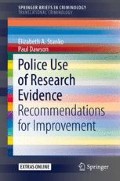Abstract
This part of the book advocates that you understand the ‘theory of change’ behind the use of tactics compatible with the problems you are facing. Even when we think we know the link between the policing tactics we choose and the problem solved this is often translated into ‘improved performance’. Many of you will be working inside a police organisation or researching within one and have grown weary of performance regimes. For many reasons, the term ‘performance’ has become a dirty word in policing. There are many reasons why this may be so. There is great pressure on police managers to reduce crime (as measured by crime surveys and as measured by police’s own recorded crime figures), but with little understanding that the drivers of crime have been robustly addressed to lead to sustainable improvement. Reducing crime in number may also reduce the crime problem. But this is not always the case. Understanding the problem, and focusing on the drivers of the problem, can help you not only conceptualise how to reduce this presenting problem but make observations about how other collateral problems might be addressed. Performance, achieving best policing results such as reducing crime, increasing victim satisfaction or making a city safer by reducing violent crime, can be driven through a focus on tackling the drivers of the problem. Performance discussions are in our experience too often a blunt instrument worrying about numbers, fed by a wary and cynical internal working culture working to get those numbers to go in the right direction. As we have observed, the very way policing is organised day to day—short-term goals, short-term assignments, siloed working—is not conducive to understanding the root causes of people’s need for and use of the police, and such insight is critical for more defensible progress. To put it simply, insight is not (and should never be) limited to Chief Constable, Commissioner or Ministerial terms. Sustainable reduction is best and far more convincing to the public and any oversight board in a performance meeting. So while we advocate that you avail yourself of the best information available to manage a wide range of problems, what this book advocates is having a more viable and active process to make problem solving an integral part of your working life.
Access this chapter
Tax calculation will be finalised at checkout
Purchases are for personal use only
References
Bacon, M. (2014). Police culture and the new policing context. In J. Brown (Ed.), The future of policing. 103–119.
Chan, J. (1997). Changing police culture: Policing in a multicultural society. Cambridge: Cambridge University Press.
Lum, C., Telep, C., Koper, C., & Grieco, J. (2012). Receptivity to research in policing. Justice, Research and Policy, 14(1), 1–35.
Reiner, R. (2010). The politics of the police (4th ed.). Oxford: Oxford University Press.
Author information
Authors and Affiliations
Rights and permissions
Copyright information
© 2016 The Author(s)
About this chapter
Cite this chapter
Stanko, E.A., Dawson, P. (2016). Step Three: Digging Down and Understanding the Problem and Its Context. In: Police Use of Research Evidence. SpringerBriefs in Criminology(). Springer, Cham. https://doi.org/10.1007/978-3-319-20648-6_4
Download citation
DOI: https://doi.org/10.1007/978-3-319-20648-6_4
Publisher Name: Springer, Cham
Print ISBN: 978-3-319-20647-9
Online ISBN: 978-3-319-20648-6
eBook Packages: Law and CriminologyLaw and Criminology (R0)

